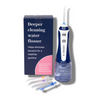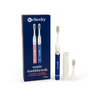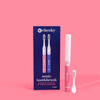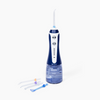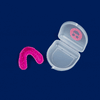Everything that you do with your mouth can have a serious impact on your oral health. Bruxism—otherwise known as teeth grinding—is one of the most common tooth-compromising habits. Take a moment to learn what this condition is, what causes it, and how you can stop it from stressing your teeth and potentially leading to pain.
What is Bruxism?
Bruxism is the official term for unconscious teeth grinding. It occurs when you clench your teeth together and/or push them together and move the jaw to grind the upper and lower teeth against one another. The idea of your teeth grinding against one another may give you chills much like imagining nails sliding down a chalkboard. You may still grind your teeth regularly because it happens without conscious awareness most of the time.
You can grind your teeth while sleeping or when awake. Some of the most common reasons for daytime bruxism include:
- Stress response
- Concentration or focus habit
- Anxiety
- Anger and tension
- Frustration
Any intense emotion could cause you to clench or grind your teeth. With time, this habit can impact your oral health. Wearing a custom night guard can help, but it’s important to understand the symptoms and impact of bruxism in addition to stopping the habit.
Physical Symptoms of Teeth Grinding
There are some physical symptoms that may hint that you’re grinding your teeth. The more you grind, the more apparent these symptoms may become. The symptoms include:
- Tooth damage
- Tooth sensitivity
- Jaw pain
- Jaw soreness
- Facial pain
- Earaches
- Headaches
- Locking jaw
- Popping or clicking sound from jaw
If you don’t realize that you’re grinding your teeth, you may experience frequent headaches or visit the doctor over and over for earaches without ever connecting the two problems. That’s why we’ll talk about ways to determine if you’re grinding your teeth in a moment.
The Long-Term Impact of Bruxism on Our Teeth
Did you see tooth damage listed first in the physical symptoms of teeth grinding? We put it first on the list because it’s one of the most concerning outcomes when you grind your teeth too often. The teeth may first start to flatten out as a result of the friction produced while grinding. With time, you may also experience loose teeth, broken teeth, or cracks and chips in your teeth. You can even discolor your teeth through bruxism.
These problems can lead to substantial pain that interferes with your daily life. They may also leave you vulnerable to serious dental issues that require more extensive treatment.
Teeth Grinding and Your Jaw
When you push your teeth together, you create tension and stress along the jawline. Over time, that grinding can negatively impact the temporomandibular joints, which are referred to as TMJ. There is one joint on each side of the mouth. The result is often temporomandibular joint disorder, which is also known as TMD.
There are multiple reasons you may develop TMD, so you can’t assume that teeth grinding is the culprit. Working with a dentist to assess the condition of your teeth and jaw can help you determine if you have TMD, if you grind your teeth, and how the two conditions are connected.
The symptoms of TMD are similar to that of bruxism, including:
- Earaches
- Facial pain
- Headaches
- Difficulty chewing
- Pain when yawning
- Tender or sore jaw
TMD also creates misalignment in the upper and lower jaw when you close your mouth. That’s one symptom that doesn’t come from teeth grinding alone. When bruxism is the cause or a contributing factor in the development of TMD, the symptoms of grinding may get listed as symptoms of TMJ dysfunction.
It’s important to understand the connection between TMD and bruxism so that you can wear a mouth guard or night guard to correct the grinding in addition to treating your jaw. You may also need to fix issues with your teeth if you’ve been grinding your teeth for a long time.
Are you Grinding Your Teeth? How to Tell
One of the most common signs of teeth grinding is pain in the following areas:
- Teeth
- Gum line
- Jaw
- Head
If you often wake up with a headache and your jaw aches or feels sore, there’s a good chance you grind your teeth while sleeping. If you experience a sudden jab of tooth or gum pain, stop and question whether you were just clenching your teeth together or grinding them. If you can detect the discomfort and stop yourself while in action, you can determine what is driving your grinding habit.
Unfortunately, you can grind your teeth a lot without experiencing immediate pain or noticing what you’re doing. You may not know that you have bruxism until your dentist detects signs of wear and tear or damage to your teeth.
Can You Restore Damaged Teeth Caused by Bruxism?
It’s difficult to repair substantial tooth damage caused by tooth grinding, but a dentist can help. The first step is to determine the cause of your tooth grinding and find a way to stop it. That may involve wearing a night guard while you sleep and learning new ways to manage stress and anxiety in daily life. Mouth guards are also available to stop the grinding at critical points in your day.
Your dentist will work to restore you’re the appearance of your teeth while combating any dental pain you’re experiencing as a result of grinding your teeth. That may include using crowns or veneers to cover discolored, misshapen, or cracked and chipped teeth. You may also need dental implants or dentures to fill gaps from missing teeth.
Other possible dental procedures include root canals, fillings, and teeth straightening systems like Invisalign or even traditional braces. The only way to know what you need to correct your smile is to work with a dentist experienced in restoration.
The Easy Way to Take Care of Bruxism and TMD
Cheeky makes it easy and affordable to say sayonara to the pain and tension accompanying TMD and bruxism. Never deal with gross night guards again! Our custom nightguards will give you the best night of sleep you’ve had in months.
Pick your plan and customize your nightguard with Cheeky today.
